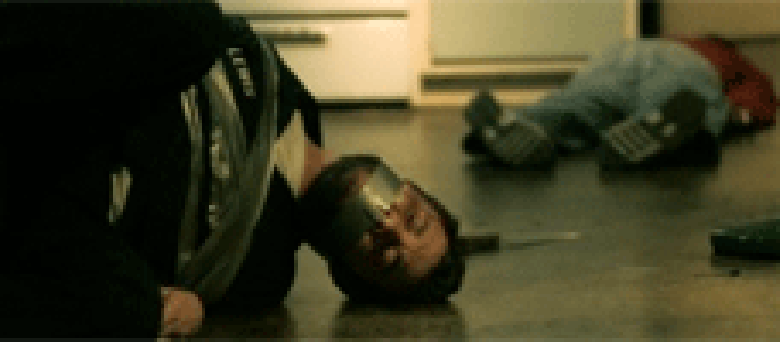Reviews
David Bruckner, Dan Bush, & Jacob Gentry
USA, 2007
Credits
Review by Victoria Large
Posted on 15 February 2008
Source Magnolia Pictures 35mm print
There is an irresistible impulse to read horror films as a commentary - intentional or inadvertent - on the current state of our world, and all the real and terrible things that we’re having trouble making sense of. They can feel like nightmare narratives bubbled up from our collective subconscious, and that’s one of the reasons I love them. The Signal, a new horror film in which a mysterious transmission from televisions, radios, and phones apparently drives the world quite violently mad, gets pretty far on the potency of its premise. Like the original Invasion of the Body Snatchers, whose Pod People can be Communists or Red-hunting conformists, depending on who you’re asking, The Signal could be about the vulnerability of our tech-happy society to whatever tickles our BlackBerrys, or it could be about our disarming willingness to blame the media and technology for our troubles while remaining eager consumers, complacent in the knowledge of our supposed suggestibility.
But what the film captures best, and least ambiguously, is the alienation of being terminally plugged-in. In the early going, Mya, the young woman whose story ties The Signal together, slips on the headphones to her discman before heading out into an Atlanta decimated by senseless murders. A few audience members might find this incredulous, but only if they’ve never walked the streets or ridden in a crowded subway car with a crowd of people hooked into their iPods, telltale white wires trailing from their ears. Watching the film, I was reminded of a quote from Ray Bradbury regarding the media-intoxicated world of his novel Fahrenheit 451:
I thought I was describing a world that might evolve in four or five decades. But only a few weeks ago in Beverly Hills one night, a husband and wife passed me, walking their dog… The woman held in one hand a small cigarette-package-sized radio, its antenna quivering. From this sprang tiny copper wires which ended in a dainty cone plugged into her right ear. There she was, oblivious to man and dog, listening to far winds and whispers and soap-opera cries, sleep-walking, helped up and down curbs by a husband who might just as well not have been there. This was not fiction.
The conceit of The Signal is similarly disturbing because it too doesn’t feel far removed from fiction. Those creepy dead-city scenes heavily echo the ravaged London of Danny Boyle’s 28 Days Later (perhaps too heavily), but they work with grisly effectiveness in this context. (The cover of Joy Division’s “Atmosphere” emanating from Mya’s discman is the film’s most inspired musical choice; pity that Ian Curtis’ Prophet of Doom voice was likely more than the filmmakers could afford to license.)
Also frightening, and pointed, are the scenes where the characters, their perceptions confused, begin assigning blame for their hurts seemingly at random. “She shot me,” becomes, “You shot me,” without much rhyme or reason. Absolved of guilt by “the crazy” that has seized the population, civilians are ready to kill anyone in purported self-defense, for threats real or imagined. It suggests a world that has been at edge of hysteria all along, all too easily pushed over the edge.
Yet while The Signal crackles with nifty ideas, it also falters into unevenness. This may have been inevitable, as the film is something of an anthology, broken up into three different “transmissions” and written and directed by three different filmmakers: David Bruckner, Dan Bush, and Jacob Gentry. Bruckner’s the one who starts us off with that creepy opening sequence of the characters slipping into insanity and the city being laid to waste. It’s jolting stuff, if predictably heavy on that motion-sickness-inducing shaky cam stuff that’s all the rage these days, and of the three segments, it’s the one that could best stand as a short film on its own. But Bush steers things in a different direction when he takes over the helm, injecting some broad, gruesome, and at times off-putting humor into the story. The stylistic jump from Bruckner’s grim hyperrealism jars, and the introduction of Chad McKnight as a goofily oblivious dude named Jim Parsons feels like a misstep; it’s as though that party-happy deputy from Cabin Fever has wandered into the film uninvited. The work feels messy by the time Gentry moves in to finish the deal, though he does find some imagery that sticks, including a wall of televisions transmitting that swirling, psychedelic signal and the blank stare of a character transfixed by them.
By the time “Atmosphere” crashes over the theater speakers again and the credits roll (featuring loads of characters with names like “Random Body” and “Man on Fire”), you’ll likely be a bit wearied of the experience, drained from the film’s whiplash shifting of tonal gears and having had more than your fill of enraged pummelings and bruised, blood-matted characters losing their minds. But you’ll also have plenty to mull over, and you may be shaken, just a little, out of that dangerous passivity from which The Signal’s horror springs.
We don’t do comments anymore, but you may contact us here or find us on Twitter or Facebook.



